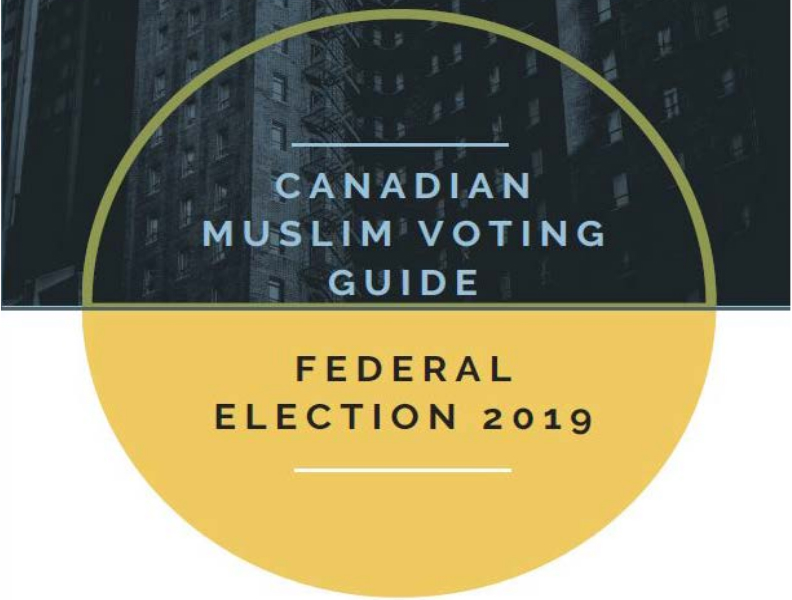Jewish groups have raised concerns about a government-funded voting guide for Canadian Muslims that was distributed days before the Oct. 21 federal election and included support for the boycott, divestment and sanctions (BDS) movement against Israel.
The “Canadian Muslim Voting Guide: Federal Election 2019,” which came out on Oct. 18, was released by the Canadian Islamophobia Industry Research Project at Wilfrid Laurier University in Waterloo, Ont., and recieved $24,923 from the Social Sciences and Humanities Research Council of Canada (SSHRC).
The guide rated the leaders of the Liberals, Conservatives, NDP, Greens and People’s Party on six issues relevant to Muslim Canadians. The first four topics had a domestic focus, including alt-right groups and Islamophobia, religious freedom and dress in Quebec, and immigration and refugees. The other two subjects looked at global concerns: one was foreign policy, which considered the fates of vulnerable Muslim communities around the world, such as the Rohingya in Myanmar and the Uighurs in China. The other was support for BDS.
Jewish organizations such as B’nai Brith Canada and the Centre for Israel and Jewish Affairs (CIJA) took exception to the voting guide’s inclusion of BDS, calling it anti-Semitic, and also the guide’s partisan nature, which contravened SSHRC’s funding protocol. (Both B’nai Brith and CIJA published issues guides for the election, but only to discuss areas of potential concern for Jewish voters – neither guide evaluated the political parties’ stances on the issues.)
“It is totally unacceptable that government funds have been used to promote an anti-Semitic movement in Canada,” said B’nai Brith Canada CEO Michael Mostyn in an Oct. 25 press release. “It is deeply troubling that taxpayer dollars were used to subsidize a document ‘guiding’ Canadians on whom to support in an election.”
According to a CIJA press release from the same day, SSHRC opened an investigation into the funding after CIJA reached out about the matter.
“We remain concerned that public funds appear to have been used to advance a deeply troubling political message during an election campaign,” Martin Sampson, CIJA’s vice-president of communications, said via email. “We have raised those concerns directly with our contacts in government and look forward to the results of SSHRC’s investigation into the matter.”
In an emailed statement to The CJN, SSHRC said its impartial and independent grant-awarding process is managed at arm’s length from government, so the government does not influence the process. The statement said SSHRC provided a grant to a project called Mapping the Canadian Islamophobia Industry, which put out the voting guide.
“However, SSHRC had no prior knowledge of this being produced and was not consulted in the development of this document,” the statement concluded. “SSHRC takes the concerns raised seriously and is looking into the situation.”
In an emailed statement to The CJN, Jasmin Zine, the lead author of the guide, said “I strenuously condemn anti-Semitism and stand in solidarity against oppression. I understand that some in the Jewish community see BDS as inherently anti-Semitic, while others have accepted it as a non-violent means to address the treatment of Palestinians in Israel. In putting together this guide, we took the latter position.”
She added, “I regret that those who took offence to our guide and the stance we took on BDS did not reach out to me personally to discuss their concerns. In the end, we may not agree, but at least there could be a place for dialogue and engagement. I hope that in the future these issues can be addressed with more direct and open communication. Even if the outcome is not a reconciliation of perspectives, at least there would be a process of engaging differences productively.”
After concerns were raised by B’nai Brith and CIJA, Zine said the authors of the guide faced intimidation, harassment and safety threats.
CIJA condemned such ations.
“Threats of violence, intimidation and harassment are utterly unacceptable; these behaviours violate the basic principles of democracy that we cherish, and we condemn them unequivocally,” said Sampson.
In an email, B’nai Brith spokesperson Marty York said his organization “obviously does not support anyone harassing the authors, but if the authors regret anything that they wrote/published, they should say so publicly.”
Bernie Farber, chair of the Canadian Anti-Hate Network, said intimidation and harassment are not the best ways to deal with content that upsets us.
“Don’t go into violent word rants because that’s what really triggers violence, and that’s what we’re trying to avoid at all costs,” he said, adding that he has been subject to intimidation and harassment for being a Jew, a progressive Zionist and an opponent of the far right.
“I don’t want people to think that I’m pro-BDS. That’s not what I’m arguing here. I do have issues with BDS, for sure. But I have really serious issues with people who threaten other people. When it comes to the left or the right, it has to stop.”
Myer Siemiatycki, professor emeritus of politics at Ryerson University and an expert on immigrants’ political participation, said “virtually every diaspora community in Canada” wants to influence Canadian policy and opinion on issues relating to their homelands and peers still living there. Like Farber, he separated his own stance on BDS from his assessment of the situation.
“I’m not offering my own judgment on whether I think BDS is an appropriate or inappropriate intervention in the Israeli-Palestinian divide … but (rather) the appropriateness of a diaspora group drawing attention to an international issue affecting their community, (which is) very, very commonplace in Canada,” he said.
He mentioned Hong Kongers, Tamils and Jews as other examples of diaspora communities in Canada with legitimate international concerns who have tried to draw political attention to the plights of their compatriots.
Siemiatycki also pointed out that Muslim Canadians vote based on many more issues than just the six in the guide.
“They’re concerned about the environment. They’re concerned about health care. They’re concerned about the same range of government and political issues as all Canadians,” he said. “They are Canadians.”
